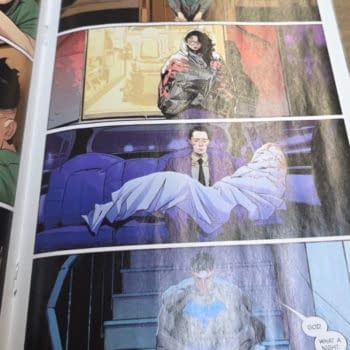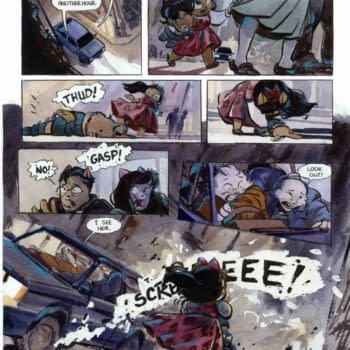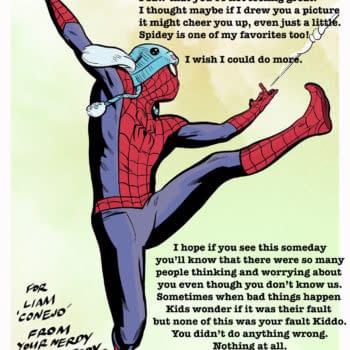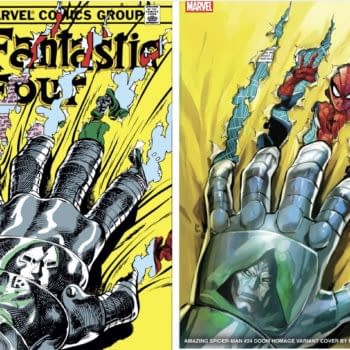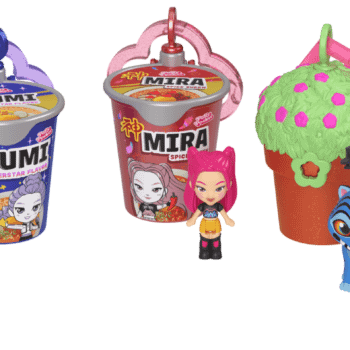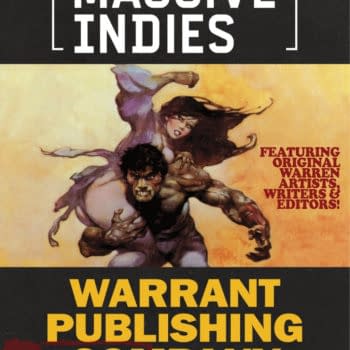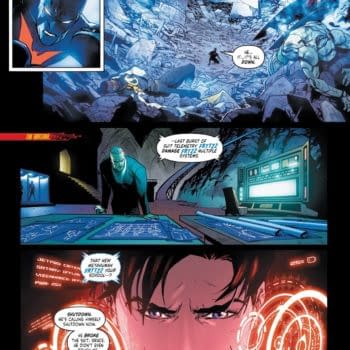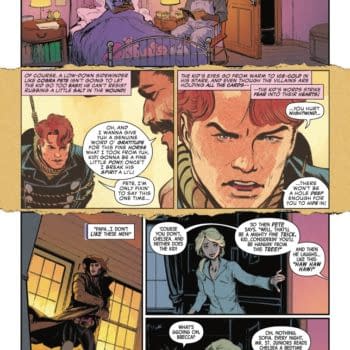Posted in: Comics | Tagged: Comics, entertainment
No More Black Panther Comics, But Maybe A Novel – Christopher Priest's Bleeding Cool Interview
Christopher Priest, writer of classic runs on Black Panther, Quantum and Woody and Xero (among many other things) and former editor at both Marvel and DC Comics sat down for an extended interview with Hugh Sheridan at this year's San Diego Comic-Con.
Along the way he told us he'd rather write a Black Panther novel – but not comics. That he doubts he will ever work with MD Bright again. How he actually wrote Amazing Spider-Man Annual but credited it to Jim Shooter, in a fraudulent attempt to pay him back for buying his office at Marvel a computer. How an IRA bomb threat ended his career at Marvel. How he worked on a Luke Cage movie with Stan Lee and Edward R Pressman in the nineties. How he is bringing Jericho back from the dead in Deathstroke. And lots about buses…
Hugh Sheridan: Okay well, let's start at the very beginning. How did first find and start reading comics?
Christopher Priest: I didn't find comic books, comic books kind of found me. I was sick, I had the measles or some childhood kind of thing and I was bedridden and my mother brought home some comic books one day just "here was something for him to read while he's sick" you know? And it was a Jimmy Olsen comic book and I think something else – like a Jughead comic book.
I wasn't much into the Jughead, but the Jimmy Olsen thing – I had seen Superman on TV but I had never read any of his stuff so that was my first encounter with comics and I really liked it. This was 1968.
I became an avid DC Comics collector – much to my mother's horror. She thought they were a waste of money – "15 cents – they are too expensive – you are throwing your money away!". So periodically when I was at school she would go into my room, take away all of my comics and throw them away which is why to this day I do not have any of those old classic comics.
HS: Before you became professional was it always DC you were reading or did you make a transition to Marvel at some point?
CP: I think it was '69 – I think it was a year later or two years later – my mother read in the newspaper that there was an issue of Spider-Man that dealt with drug abuse. It was that famous two or three issue story where Gwen Stacy died and the b-story was Harry Osborn who was strung out on drugs. Mom thought that was an important thing to deal with, so she bought that for me.
I had never read a Marvel comic before, I was a straight DC guy, I was like "Who is Spider-Man? What is this all about?" and I read that and I think I started buying Marvel and almost never looked back.
DC was dealing with kind of an idealised universe, and idealised world where Batman could stand around and talk to the police "There officer! There's the crooks!" while Marvel was dealing with what Stan Lee called the "world outside your window". It wasn't a cynical world it was just a more realistic world.
HS: Did you always intend to get into the business or was it something you fell into? You started as an intern right?
CP: I started as an intern at Marvel Comics in 1978. When you are a poor black kid in New York City you have no inkling that you will ever be anything else. So it never occurred to me that I could break in to comics; I don't think that I ever even tried to break in to comics.
I knew I wanted to be a writer; I knew I wanted to write. So I started writing when I was 10 years old. I have been writing virtually every day of my life since I was 10 years old.
HS: What type of stuff were you writing as a child?
CP: It was mostly super-hero stuff. When I was 10 years old I asked my mother for a typewriter. She said "You want a what?" I said "I want a typewriter" she goes "you mean like a toy typewriter?" I was like "I want a real typewriter! I want to type!" and she's like "what 10-year old asks for a typewriter?". But my mom, bless her heart – thank god – she went out and she actually bought me this Royal Portable Typewriter.
I beat that thing to death, writing every day. The first thing I wrote was a Batman novel – 64 pages of bat-action!
Do you still have it?
CP: Oh, I wish I did! Then I started writing Gigantor – I loved Gigantor back in those days – and some other stuff. But I just started writing every day. It never occurred to me that I could become a professional. I would have liked to have become a professional, but my mother wanted us to have realistic expectations so she would set our eyes on something else. She wanted me to be a lawyer, I wanted to be a bus driver.
Actually I did become a bus driver at one point. I quit comics in 1990 and went and got some training and I was driving some big Greyhound type tour buses all over the place.
By 1990 I was a full-fledged professional; I had already been an editor and everything. I got really burnt-out with the business and I decided I wanted to do something that was the total opposite of that. I had always wanted to drive buses. I talked to my wife about it and I said "I know it sounds crazy, but I'm leaving this job that pays very well to do a job that, well, doesn't pay very well, but I love doing it".
Frankly, if I could get a bus driver job now I would probably not be writing Deathstroke. I love driving buses. It is so much fun driving something that big.
HS: What was it like working in Marvel in the 1980s, under Editor-In-Chief Jim Shooter?
CP: I never thought I would actually work there. I got into journalism through a trade school. New York City has a bunch of specialised high schools, one of them dealt with journalism and printing and those things, and they had an internship program. So I was learning magazine journalism and print journalism and so forth. They set me up with this internship program and they set up a bunch of interviews for me– three law firms and Marvel Comics.
I blew off the law firms – didn't even show up for those interviews – but with Marvel I said – okay I'm never going to get this, but I'll show up anyway. So I showed up and there was like 4 artists in the waiting room and me.
HS: Do you remember who they were?
CP: No. They were all being interviewed by Jim Shooter. I came in with this amateurish comic book that I had made.
HS: Written and drawn by yourself?
CP: Yeah I started out as all things – I was artist and writer. Jim liked the writing. I wasn't nearly ready as an artist, but he liked the writing. So he decided to take me on. I was lucky enough and blessed enough to have that door open for me and that's how I got in.
Now Marvel in the 80s was a lot like the TV series Mad Men. The set on season 1 on Mad Men looked almost exactly like the Marvel offices. It was very scary how closely it resembled the Marvel offices. I remember those desks!
HS: Was there as much drinking, smoking and carousing?
Oh yes. A lot of them didn't really smoke. They all cussed like sailors. There was a lot of not politically correct humour. So there would certainly be black humour. I was the only black person there.
HS: They didn't censor themselves at all around you?
CP: Oh no – hardly no. But to be fair – there was also Jewish jokes, there were certainly Irish jokes or Italian jokes. No one was safe. So I can't necessarily single them out and say they were racist because they made fun or whatever.
It was irreverent, it was rowdy. It was a very different environment. So Jim Shooter came in and tried to more-or-less establish order and he became the most loathed person in comics.
Even though Jim Shooter and [former DC President] Paul Levitz respectively really over-hauled the whole industry to the point where everybody started to make a lot more money. We started getting royalties because of Jim Shooter; because of Paul Levitz.
Shooter did very many good things, but you have to understand that – along with the ability to have a childish imagination and come up with these amazing stories – you kind of have a childish personality and nobody likes dad. And Shooter was dad. But it was an interesting place to work.
HS: You got a pretty huge assignment quite early on as an editor – you got the Spider-Man books. You also started up your own column "The View From The Tenth Floor". That was unusual – the editor of a book having his own column in the letter pages – what was the reaction to that?
I don't think anyone noticed or cared. It was like prehistoric blogging. A lot of those little snippets was just me doing Stan Lee's Soapbox. Some of them had absolutely nothing to do with anything. I don't even remember what half of them were. No – no-one seemed to notice or care.
I got Spider-Man when I was finally promoted to editor – I think it was '82 or '84 – whatever it was. We had a meeting with all the editors. Jim Shooter, of course, was chairing the meeting and he was going to shuffle the books around as they often do. I was supposed to get a full slate of the crappiest books they had – y'know – to cut my teeth on, I'm learning now 'cos I'm the new guy, the new guy always gets the shit.
But before he could do that he said "who is going to take over Spider-Man?" because the Spider-Man editor was moving on to something else. Once he settled the Spider-Man thing, then he would know how to shuffle the books around and I'd get my slate of crap.
Nobody wanted Spider-Man. All the editors, all the senior editors they were all happy with their assignments they all wanted to keep their assignments and Shooter thought about it for a long time and he said "well I guess Jim [Priest was named 'Jim Owsley' at the time] will get the Spider-Man books".
I was only 21 – so if I was only 21 it had to be '82 – only 21, black guy and my first editing assignment and they hand me what was at the time their biggest franchise.
There was good news and bad news to that. The good news was hopefully I'd bring some energy to it. But the bad news was that they had all these people in place that were writing and managing these books and they were all Marvel staffers and kind of juiced-in, you know senior Marvel staffers and Shooter would throw me in to the lion's den and there was an expectation that I would just rubber stamp whatever they did.
So every time any kind of editorial decision these people would go storming in to Shooter's officer and say "Do you know what Jim did?" and he would go "well he is the editor". So It didn't go very well. Ultimately I got my own team on the books.
HS: You were one of the first people to hire Peter David, weren't you?
CP: Yeah and I took a lot of flack for that. Peter submitted a story on spec.
HS: The commuter issue of Spider-Man?
CP: It wasn't the commuter story – it was a story that dealt with Leopold and Loeb; it was like a mystery story and it had a twist ending. He asked me to read it and I was like "ehhh … I got so much to do … alright"
But Peter and I were personal friends. I mean like go over to his house friends, play with his kids friends. He was assistant sales manager at Marvel at the time.
So I took it home and read it. I got to the end of the thing and the twist ending just got me. So I came back the next day and went like "Y'know that is not easy to do, because I read a lot and it's not easy to surprise me and you did that and I'm buying the story – so fill out this voucher – I'm buying the story".
Then I started having Peter do some fill-ins and that made me even more hated because the editorial department deeply disliked the sales department. Which I thought was incredibly stupid because the sales department sells their books. So even if you don't like them – lets co-operate – let's all be friends.
But people, particularly the senior editors at Marvel, like several – 2 or 3 of them would show up at my office and close the door and go "what are you doing? you can't hire that guy" "Why?" "Because he works for Carol". Carol Kalish was the head of the marketing department.
So I went "So?"" and they would say "well they are the enemy". But Peter was an extraordinary writer. So eventually I hired him full-time for the Peter Parker book and he did outstanding work.
Then the rumour began to circulate that I was hustling the company, because the work was so good they thought that it had to be my work, that Jim [Owsley – Priest's former name] is actually writing it and that Peter is vouchering it and kicking the money back to me.
That rumour actually got legs to it. Almost to the point where Shooter wanted to look in to it and I went "you are out of your mind – he is actually a good writer" and it wasn't until I left Marvel and somebody else hired him for something that his career started to take off, because they started to realise "oh he actually is writing this stuff".
HS: Bob Harras hired him on The Hulk I think?
CP: Probably Bob Harras, he did Hulk then he went on to X-Factor or something and then Peter just became Peter. But he was brilliant all along and a great guy and he didn't deserve the grief that he got early on.

CP: No- I didn't even want the job. I think Kurt Busiek was writing fill-ins, temporary writer or I don't know what, but Jim Shooter wanted to put me on a book. He said that the way a writer learns to write a book is he writes.
So Jim came down the hall with me in tow; I stood out in the hallway while he went in to [Power Man and Iron Fist editor] Denny O'Neil's office, closed the door and told Denny essentially to put me on the book. I don't know if I bumped Kurt or bumped Jo Duffy [another former PM/IF scripter] and if I did I'm so sorry about it but I was out in the hall, I didn't know what was going on.
Next thing I know I am introduced to Denny O'Neil, who was like a hero of mine – I admired that guy so much – but he was not happy about being told who to put on his book. So I had to earn his friendship and earn his respect by being good at what I was doing. Eventually Denny and I became fast friends and he is like one of my dads in the business, but it started out really unpleasant. You don't want someone through the door and telling you what to do.
I also didn't particularly want to write Luke Cage because I thought that the character was childish and immature and that he spoke in this strange language. So I really was not happy about it but then Denny reassured me that I can use my own interpretation of the character and I ended up scaling back some of what I thought was not in genuine language.
Instead I just made him a little immature to explain his histrionics. That Luke is a little immature and he's got like a hair trigger temper. During that time some Marvel staffers actually said to me that I am terrible at writing black characters – and I said "really? Why?" "because your Luke Cage is awful – he doesn't talk like he should"
I wrote The Falcon and I stopped having the Falcon talk in that jive talk stuff. The Falcon was a social worker and in New York City you can't get a job as a social worker without having a MSW, a Masters in Social Work. You can't get a Masters in Social Work without articulating the English language. You can't be a dummy and get that degree, so why is he talking like that that makes no sense – so I got rid of that.
HS: On that series you worked with artist Mark Bright – you have collaborated a lot together since then – was that your first work together?
Once before – I did a fill-in for Iron Man – just an inventory story – Mark Bright was some new kid that came through the door and Shooter was like "alright we have this script lying around, here you go – draw it". That's how I met him.
The Falcon was drawn by Paul Smith who went on to fame through Uncanny X-Men and when the first issue was drawn the editors circulated Paul Smiths pencils all over the office, but they were unlettered so the editors saw his art but never read my story. So Paul was swiftly elevated to these things and as for me, it was just assumed that well "we don't think this guy is any good". Which is what people do until you prove that you are.
It's not even a white thing or a black thing, it's just the way it is; they just assume you can't write until they read something that knocks their socks off.

CP: Yeah. That was kind of right in the middle of the Power Man thing. We were having a meeting and Shooter was on a rampage because we were having some weak numbers. He said "You guys should be innovating" – talking to the editors – "you should be coming up with fresh ideas that have huge sales potential; You should be doing things like – I don't know – Spider-Man Versus Wolverine – someone needs to get that done"
I stuck my hand up and said "I'll write it; I want to write that" and he went "fine" and he turned to [then X-Men editor] Ann Nocenti and said "you edit it". Ann was not happy about that. Obviously Ann didn't want to do the book at all but if she was going to do the book she wanted to pick her own team. But Mark [Bright] and I got to do that.
To this day it is probably the best remembered or best reviewed story that I have written; particularly the best Spider-Man story. It sold a kajillion copies; they went back to print several times with it. It is a very well known, very respected story and Marvel never asked us to do it again.
The royalty check from that – I couldn't have bought a house – but I could have put a strong down-payment on a house. But they never asked us to do it again because a lot of their decisions in those days – I don't know what Marvel is anymore – but in those days a lot of their decisions were personality based – you know? "Do I like this guy?"
Whereas Jim Shooter, who kind of mentored me – he explained to me once "It doesn't matter whether you like the guy personally or not, can the guy do the job? is he the right fit for the book?; Even if you hate the guy's guts you hire him because – you know – the guy rocks – let's go!"
I don't know if it's necessarily race, or if its personality or if it's just kind of familiarity because – you know – I'm just little Jim Owsley – down here in the corner office – whatever the reason was.
HS: You were quite young at the time, could that have been a factor?
It could be. Whatever the thing was, despite the fact we really hit a home run with that and then some, neither Mark nor I were really thought of for high-profile projects or taken seriously.
HS: Was that part of the reason that you made the transition over to DC and became an editor there?

I read it – I thought it was fine – I gave it to Jim Shooter as was our practice in those days. Jim read it – he thought it was fine. In those days he physically signed his name on the copy to approve it. So there was a copy in my office signed by Jim Shooter. We both approved this story – it was fine – it went out.
It grievously offended someone and Marvel received a bomb threat from someone claiming to be from the IRA. Now my thinking was – the IRA is raising way too much money here to blow up Marvel Comics. This is obviously some kind of gag on someone's part. But they evacuated the building – blah, blah blah – to cut a long story short that's when the Sanhedrin gathered to find a way to kill Jesus.
My days were numbered from then. They couldn't fire me because of the bomb threat but here was a lot of pressure put on Shooter to get rid of me and a lot of pressure ultimately extended in my direction.
What happened was that Marvel offered me a writer's contract that was way more attractive than as a staffer. So they bought me – and I was for sale. I said okay – I'll sign a contract – I've got two books a month; I've got health insurance; I'm making more money than I'm making sitting here and I can work I my pyjamas.
So basically Jim was like we're not going to fire him we are going to make him work from home so that's basically what happened.
HS: Which job did you prefer to do at the time editing or writing?
CP: Well I liked to do both; I liked to split the difference. I liked to write one book a month and I liked to be part of the creative process, because at Marvel another thing I was harshly criticised for was I was using newcomers. I was using a guy called Marc Silvestri on a Conan book.
Marc in those days was really scritchy and he hadn't quite found his voice yet, so much so that inkers really resented having to ink him. I called Marc and I said – "okay from now on you are going to have to ink yourself" but he's like "but I'm not an inker" and I said "well, you are now; because you need to learn why these guys don't want to touch you".
Making him ink himself, his work started getting better and better because he started to see where his weaknesses were. But several times Shooter would duck his head in the office and go "are you really sure about this guy?" and I would lay on the railroad tracks in front of Marc Silvestri and go "this guy is going to be huge one day"
Peter David, Marc Silvestri, Kyle Baker, Mark Beachum –
HS: Yeah, Mark Beachum! whatever happened to him?
CP: He's still around, but he doesn't do a lot of comics
HS: He does some work or Heroic publishing I think ..
CP: I don't know. I just bumped into a friend of a friend and I'm just sending messages through channels "please tell Mark to get in touch with me". I just want to know how he's doing. I mean he was a personal friend.

CP: Yeah. I don't know if I should tell you this, but I wrote that actually. You know that rumour – that Peter David was secretly Jim Owsley. This is similar, but actually true.
Jim Shooter's name was on it [The Spider-Man Annual] because Jim Shooter bought a computer for our office out of his own pocket. This was our scheme to get Jim reimbursed for the computer. So I wrote the Spider-Man Annual with the Iron Man of 2020, but his name was on it, he vouchered it and y'know the statute of limitations is up, they can't come after us now. So that's how we paid for the computer because they were never going to buy one.
HS: Did anybody try and compensate you for writing the annual?
CP: No, but I got to take the computer home. So I kept the computer. But the point was that I was the first editor at Marvel to install an answering machine, because we were very, very busy and the phone would ring off the hook. You would pick it up and it's some lonely freelancer sitting in his pyjamas and he would bite your head off.
So I put an answering machine in there and was soundly criticised and mocked by the other editors.
HS: I suppose Marvel's secretary Flo Steinberg was long gone at this point?
CP: Yeah, she was gone by that time, but I knew Flo -she was very nice – very kind person.
Then, once we had the computer and the answering machine all hell broke loose. People were walking in to Shooter's office complaining – "what does he need this hunk of junk over there for?" and all this kind of stuff. Now it's unthinkable to not have voicemail and a PC system.
So anyway I was under contract there for a number of years and some of the books got cancelled and then finally I think I ended up writing Conan The King for Marvel but I had started doing some freelancing or DC – I think I had started writing Steel or something.
But at some point I just got burnt out and I said "you know what? I just don't want to do this". I might have said "I don't want to do it anymore" – but I meant "I don't want to do this for a while".
I started driving buses and I fell in love with that. And I was doing some development work with Stan Lee and Reginald Hudlin for a Luke Cage, Power Man movie in Hollywood – this was 20 years ago – that did not get made because the CGI was too expensive and too crude back in those days to make it work.
We were working out of Edward R. Pressman Productions with Ed who was a legendary producer in those days and it was just really freaking me out because I would call Ed and his secretary would patch me through to the golf course and it would be like "Hey Jim! how are you doing?" and I would be like "Ed Pressman knows my name!"
Of course Stan Lee – he was in the office when I was an intern, so he knew who I was [Stan Lee impression ] "Hiya Jim! How are you doing!". Of course Reggie, I had been introduced to Reggie through [artist] Denys Cowan and it was a really great opportunity. So I was doing some of that stuff, some of the development work while I was mainly driving a bus.
When you drive a bus you pick the people up; you drive them in to work; all the bus drivers they park their buses in New York so you don't burn up all the gas. We all hop on one bus and are driven back to New Jersey. So on the ride back to New Jersey I'd pull out my laptop and I'd knock out a few pages of script or whatever.
I would make more money on the ride back to the garage than I wold make all week driving a bus. But I liked driving the bus.
HS: So how did you become an editor at DC then?
CP: That was a bit of manipulation on the part of Mike Gold – who was an old friend. Mike Gold was running the research and development division of DC. So he got to do a lot of fun stuff, but he really just got to make stuff up – formats, different books or whatever like that. He had a budget to burn money trying to find the next thing.
Mike called me up because I was doing another book – a graphic novel with him – and he tried to convince me to come on board as an editor. I don't know if that was part of some sort of affirmative action thing, but I think at the time Mike was having an argument with Dick Giordano, the editorial director, that the place was too white – y'know – "sooner or later someone is going to notice that you don't have any black people around here"
According to scuttlebutt he called [writer and then Marvel editor] Dwayne McDuffie and Dwayne turned him down, so he called me. Now I turned him down and I said "well now look, I have this great bus driver gig and they give you the nice uniform etc."
I said "look I got a sweet gig here. It's a split shift, you go to work at 5 in the morning, you are off at 10, you have the whole day to lie around and watch Oprah and you go back to work at 3 o clock. I never have to figure out how Spider-Man gets away from Doc Ock right? Why do you want me to go back into that?''
But Mike, when he wants to be he's very persuasive, so I made a deal with him I said "okay if you can pay me I can do it, but I'm going to keep my bus driving job and the DC gig has to pay more than the bus driving job pays"
So I arranged my shifts – I had seniority by then – to have a very low mileage route. I would drive the bus in the morning, drive it to the port authority, go to DC Comics and be an editor all day, and at 5 o clock go back to the port, start up the bus and drive those folks home.
HS: You must have been exhausted at the end of the day?
CP: Well that didn't exhaust me so much as I was at the same time producing my wife's album. She was a singer, she was signed to Capitol Records at the time and I was writing and producing her music.
In addition to that full day and the two jobs I would get home – we had a little home studio and I would get home and I would have to start mixing her record. I would be up half the night doing that and I would get a couple of hours sleep then start driving the bus again. It was kind of freaky back in those days.
But yeah I started working at DC. That was kind of great too because it was very different from doing monthly books because Mondays were different from Tuesdays and Wednesdays were different from Thursdays and we literally sat around and thought stuff up and bounced stuff off of each other and bounced stuff off of the wall and tried different formats and commissioned different things and we actually had a budget to do that. That was a lot of fun and we also developed the Impact! Line aimed at younger readers.

CP: Yeah for The Comet. I take no responsibility for Mark Waid. Mark Waid was already established and he's an absolutely brilliant writer and a good friend. I was his editor on the Comet and I used to irritate him on it because I never read it.
I was very busy – and you know – you have to kind of deal with the problem child. So I would read Mark – what we call "on the boards" – in other words, once the book is lettered and it's all ready to go I would sit down and would read it before it goes to the printer.
So I would call Mark and go "hey that was pretty good! And he would say "what? you just read it now?" "I was busy! I trust you. You have been editor you know what you're doing". So that was good.
Then at some point they cut the department. They cut the whole department and I was given a choice to become a line editor or to take a contract and go home. And what happened was there were difficulties in my marriage at the time so I thought it would be a good idea for me to spend more time at home instead of being all over the place.
So I kept the bus driver job and [DC Executive Editor] Paul Levitz graciously offered me a development deal to basically do whatever I wanted. He said "We want you to think of something that is completely different from anything we are publishing now; that doesn't fit comfortably in any of the slots and let's see what you do"
So I said – I think we've got something – it's a property I created when I was 15 years old and it eventually became a comic book called Xero.
HS: While you were editor at DC, I think you discovered Joe Quesada, am I right? You were one of the first people to hire him anyway.

[Inker and artist] Joe Rubinstein brought Joe Quesada in with his portfolio. This young kid, skinny little kid and I said "Okay I'll look at the guy's work" and I thought he was pretty good – but "I don't have anything to offer you, call me in about a week and I'll try and scare something up for you" so we shake hands and they go down the hall…
Then I get a call from the guy drawing Spelljammer and he's unhappy about something. He wants a bigger trailer; he wants a bigger dressing room or whatever – y'know some demand. I'm trying to accommodate him, but I'm just an editor.
I make 30 grand a year, I'm lucky to have socks. There's only so much I can do to accommodate this guy and whatever the issue was I couldn't resolve it. So he's like "That's it! I quit!" and I was like "okay" –
HS: Is he still working?
CP: Yeah, I'm sure he is, but I don't want to name names.
So I hung up the phone and I thought about it for a minute. Then I went in my file and grabbed the Spelljammer script and ran down the hall out to reception and I saw Joe Rubinstein and I said to him "Joe, is that kid still here?" and he goes "yeah, he just went to the bathroom".
So the kid comes out and I give him the script and I say "bring me 10 pages in a week and you've got yourself a regular monthly book" and he went off and he drew the 10 pages and the 10 pages were absolutely brilliant – he hit it out of the park – and I put him on the book. And that kid's name was Joe Quesada, that's the beginning of Joe Quesada.

That was one of the first things I did when I got to DC. I had this idea for – I always loved the Ray – the golden age character. So what if he's a kid? and you know – he's flying around and zapping people or whatever.
I said "DC needs a Spider-Man! – why don't you guys have a character like that? I would figure that would be a no-brainer". They had tried something with a couple of characters – who was the guy with the helmet, big star on his head – Orion? Or not Orion, Omega? whatever . I think it was Omega? Anyway I wanted this young hip guy.
Not sure how I got introduced to [Writer] Jack C. Harris but I did, Jack may have been doing something else and he came in to the office and I said "let me pitch something at you – what if blah blah blah and he's a kid and the Ray blah blah blah" and Jack said "that's very interesting let me go home and see what I can do with it".
Then he came back with all the guts of the character – the photophobia, the insular stuff, Ray's indoors so now it's a new experience for him and it was, I thought, it was a brilliant extrapolation of the classic Peter Parker dynamic.
Now The Ray was a mini-series, then it ended. I obviously wanted to go ahead with a regular monthly book with The Ray but DC seemed a little hesitant. There was some either dissatisfaction or questions about Jack because Jack was real old school, and I would go in behind him and kind of tweak him a little in the writing. Which I'm sure irritated Jack, but the controversy if there was one was I think a completely manufactured one where people would be like "Owsley is responsible for the Ray and not Jack" and I went "No, that's Jack"
Then I had to fight to get Jack the equity in the character, because they were like "The Ray was a pre-existing character" and they didn't want to give it to him so I had to go down the hall and bang the drum I said "No, Joe and Jack this is a really original interpretation of this character, they deserve to have some equity in this book". Finally they relented and they wrote up a contract so Jack has equity – he doesn't own the character obviously – but he gets money whenever they do something with the Ray.
So I as working for the development department and that department eventually folds. I could go in to mainstream comics or I could go home? I'm going to go home and try and save my marriage
I get the contract to write Xero and one other book, Paul didn't really care what it was so he sends me down the Hall to Brian Augustyn who was editor at DC at the time. Brian looks over his list and right off the top he says – "well I want you to do The Ray" and I said "that's kind of Jack's – it's kind of unfair to Jack" and he is like "well it's not really unfair to Jack – Jack did his thing and moved on and if you don't do it we are just going to get someone else to do it, but we are not going to hire Jack".
I didn't think that was necessarily fair to Jack. It was a really awkward transition, but I ended up writing The Ray and they brought in this new kid, this really frightened kitten of an artist named Howard Porter. We did that book for a couple of years.
HS: Around that period you were very involved with setting up Milestone Media?
CP: Yeah that's when the Milestone thing happened. That was Denys Cowan. To the best of my recollection Denys was the guy who woke up one day and said "you know we need to do our own thing" and by "our own thing" he was talking about a black-owned thing where we are publishing in partnership with a major and so on.
We decided to approach DC because his then Girlfriend was one of the executives in DC, was working in DC, Dwayne [McDuffie] was doing some work off and on for DC. So we began that development process and we worked on that for about a year. Very hard – long, long hours, putting the Milestone thing together.
Originally it was called "Creative Partners Limited" and there were 5 partners and then when it was time to go to contract I had some questions and reservations about one of the partners and rather than cause a lot of disturbance and agita and so forth, because Paul [Levitz]– I wouldn't say that Paul would just walk away from it, but it wouldn't look good if we were squabbling, trying to get this thing done.
I thought it was more important that this thing happen than that I be a part of it. So I decided to step away and became sort of the Pete Best of the group.
HS: It must have been enormously frustrating at the time – you came up with the idea behind many of the characters?
CP: Well we try not to go "this guy created this guy, this guy created that guy" – you know – we all worked on it and everybody sort of came in with their own pieces of ideas but I was involved a lot in the creation of the Dakota Universe – it was a stone soup. Derek [T. Dingle] was mainly responsible for all the business stuff, but all the creative guys were Dwayne and Michael [Davis] and Denys and so forth.
HS: Are you involved with the proposed revival?
The plan is that I will be involved in some way in the creative end of things. They are just trying to sort out the business end and that seems to be the hold-up. I expect that there will be some movement on that shortly; it just wasn't in time for the [San Diego 2016] convention.
HS: So it's imminent?
CP: Yep. Yeah.
HS: So overall how was DC different than working at Marvel?
CP: Hah! Well back in those days working at DC it felt like I couldn't breathe- it was like this claustrophobic thing – they had all these rules – it was very establishment.
Now working at Marvel was like working at a frat house. It was swinging from the rafters – it was so laid back and casual. Jim Shooter wanted us to reinvent the wheel every month so he was listening to ideas, he was encouraging innovation. He was often heavy handed in crafting his vision. That was his effort to raise the quality of the books and he got a flack for it, but man, it was fun over there.
It was everything you thought it was. Marvel in those days was just like Stan Lee's Soapbox. "The House of Ideas" – in the sort of hip swinging lexicon that Stan would use – that was Marvel. When I got to DC it was like, okay the party's over.
What Mike Gold did not tell me, before I accepted the job was that at DC, as a staffer I was not allowed to write comics. I would have written The Ray myself. That's why I called Jack – because I was not going to be allowed to write it as long as I was on staff.
At Marvel it was the exact opposite. Not only was I allowed to, you were threatened by Shooter if you weren't doing something, because Shooter felt like in order for you to understand what the freelancers were going through you had to have that experience yourself, you have to understand that deadline pressure, you have to perform like that and you have to keep your chops up, whether you're a colorist or a letterer or a writer or an artist. Whatever your discipline is, he didn't want a bunch of bureaucrats sitting behind desks.
So some staffers, and I won't mention names, but some staffers actually got grief from him because they weren't freelancing for the company. The pay-scale was pretty crappy in those days, so writing a monthly book was also a way to supplement your income and to retain talent in a way that DC no longer can, because it's very corporate.
DC have moved physically closer to Warner's by coming out west, but Warner's has a giant like tail-end claw in to their human resources and practices and things like that. Warner's really doesn't understand that to maintain that quality creative people – "a bird has to sing" – they have to let this guy draw.
So they make certain exceptions for like Geoff Johns or Jim Lee and they have written special contracts for them, but as a general rule of thumb, my editor is not allowed to write for the company. He then probably has some non-compete thing where he is not allowed to write for some other company.
There were a lot of abuses in the 90s though, there was a lot of editors writing most of Marvel's books weren't there?
CP: Yeah but I never thought of it as abusive, I thought that a lot of these guys they worked really hard and I thought some of them were really good. I mean Denny O'Neil was writing good stuff for Marvel while he was editing a line of books. I was writing good stuff for Marvel. Al Milgrom was an artist drawing good stuff for Marvel. I don't think there was any cronyism there. Jo Duffy was writing Power Man and Iron Fist before I was writing that. I don't think there was anything wrong with that.
HS: Sure – Chris Claremont was an assistant editor when he began on X-Men I suppose –
CP: Yeah, Len Wein actually had the assignment for X-Men and the legend is – I wasn't there – but the legend is that he said "Eh, this is never going to sell" and he walked off of it and this lowly assistant editor, Chris Claremont, went "I'll do it" and whoosh!
HS: So how did 
No, they called me actually. The unsung heroes of that were Brian Augustyn and Mark Waid. They were in consultation with Joe Quesada and Jimmy Palmiotti when they were getting Marvel Knights up and running. I think Black Panther was on the list of characters that they had. Somehow people in the room, it may have been Joe or whoever – somebody said "okay this is something that Priest could do".
So I get the call from Joe and I thought – well here's my chance to write Daredevil – I knew he was calling for Daredevil. Their big title. I went "You owe me buddy – you owe me pal! Here's Daredevil!" [laughs] but no they gave that to Kevin Smith and I wasn't going to get Daredevil.
He said Black Panther and my heart just sunk. I thought Don McGregor did some brilliant work with him, but I disagreed with him on aspects of the character. I thought the world was brilliant that he did, but you know Black Panther – y'know some kid comes up literally from behind him and knocks him out – and I went "how does that happen? He's the Black Panther".
I didn't want to write that, that just didn't appeal to me and I just didn't agree with that. Then I got a call back – a conference call from Brian Augustyn and Mark Waid and they were talking it up "No no! you need to do this – it's this new thing! Really think it over!" and they talked me into it.
So I wrote the first issue of Black Panther – which I ought to post somewhere sometime – and Joe and Jimmy read it and they called me up and they rejected it. I wrote a very traditional, straight forward plot.
They said "No, no we want you to do what you're doing in Quantum and Woody. We want it episodic, we want those little title cards and we want you to tell the story out of sequence.
HS: So they asked you to do all of that?
Yeah, yeah – like Pulp Fiction in reverse. Pulp Fiction on acid or something. So they encouraged that bit of lunacy. Then they came up with this wonderful technique where Mark Texeira – they couldn't afford to pay him to paint the book but they found this sort of in-between technique that they could afford that looked painted and the rest is history.
HS: Did you know straight away that this was going to be something special? It seems to be what your name is most attached to these days
CP: No, I had no idea. At the very beginning I just assumed we were going to be cancelled. Marvel Knights transferred the book back to Marvel after #12 and I just assumed that was it, that #12 was the last issue.
One day I got a call from an editor called Ruben Diaz at Marvel and he's jumping up and down because I'm so late on #13 and I'm like "there's an #13? Nobody told me there was an #13". I had no idea, I just assumed that we were cancelled.
I got to tell you, in those days, the reason why Marvel Knights let go of Black Panther was it just was not selling. They were doing everything that they could and they just could not sell a copy of Black Panther.
Then Ruben had me try all of these things, Ruben passed the book on to Tom Brevoort and Tom passed it on to Mike Marts and every editor brought his own perspective to the book. So those changes were kind of dictated from Marvel, but they were all in the service of increasing sales because we were just drowning.
We were getting incredible critical reviews – Village Voice, Entertainment Weekly – journalists of record in addition to the fan press, but the audience was largely resistant to buy Black Panther until Reginald Hudlin took it over.
Reginald, to his credit, he went out and publicised the heck out of this thing through all his media contacts. It was after his run, of Black Panther that people started to go back and read the old run so it was kind of like Star Trek where it had low ratings and it got cancelled, but then it became popular in re-runs? We became much more popular in re-runs.
Now it's like this 'legendary run' – and I'm like, where were you people when I was writing it? We were like starving when I was writing it.
HS: Is it a character that you would like to go back to at some point? Do you still have ideas for him or have you said everything you want to say with him at this point?
CP: No, I've done everything with Black Panther other than turn him into like a fry cook. I can't imagine what story I would write. Marvel did call me last year and floated that idea of me returning to Black Panther and I graciously declined and said you need some fresh ideas and some fresh people.
I think they made some brilliant choices. I'm looking forward to great things from Mr. [Ta-Nehisi] Coates and how that's going to work. But no, I couldn't imagine what I would write with Black Panther.
What I would like to do is, I would like to write a Black Panther novel, a prose novel. I'd like to take that opening arc – that whole 'The Client' arc – and turn that into a book. But Marvel, they do some prose books, but not a lot. DC is probably more open to that sort of idea then Marvel is, so I don't know. But that I'd do, if that was a possibility.

CP: Yeah. Fabian Nicieza called me up and said "I want you to develop something for this new company I'm working for". So I came in and I talked to him and he said "We want something kind of like what you guys did on Power Man and Iron Fist. We want a buddy book, a buddy super-hero book"" and I said "okay".
He was going through lists of artists who he could get to draw this thing and I said "If you want Power Man and Iron Fist why not get the guy who drew Power Man and Iron Fist?" There was initially some hesitation – for whatever reason, I don't know – but eventually he said "okay, let's just do it".
So I called up Mark and Mark really wasn't interested. Mark was like "Well, we already did that; What is going to be different about this?" and I said "I don't know, I'm just getting started, let's talk about this, let's toss ideas around"
So he tossed out the idea "I'm just tired of the black character always being the comic relief, this time I want to make the white character the comic relief". So anytime you see our credit it always says 'Created by M.D. Bright and Priest' as opposed to putting the writer first because the germ of the idea started with Mark.
He said that and so I said why don't we do White Men Can't Jump? the Wesley Snipes movie with Woody Harrelson, where Woody is kind of the idiot and the black guy is the straight guy and he seemed to like that idea.
I don't know where I got the name Quantum from – I always call him Quantum!! because he's very serious like that – and I said what are we going to call the Woody Harrelson character? Mark and I we really banged our heads together for days until finally we said "why don't we just friggin call him Woody?" So Quantum and Woody!
The Quantum and Woody characters they mirror my relationship with Bright. I don't know whether he's Quantum or Woody – I think that he's both – it all depends on what day of the week that he gets up on. But he's a dear friend, and I really believe that we love each other like brothers and there's times when we really can't stand each other. The working relationship was just that volatile.
[Original Quantum and Woody publisher] Acclaim may have been the best and most positive work experience of my career, because it wasn't as wild as Marvel but my god – you could breathe at Akklaim. Fabian having done this job [writing] having been on this side of the desk for so long, he really knew how to handle freelancers; he knew how to stand up for us and encourage innovation so it was a great experience.
HS: What was it like returning to the characters recently, at the new Valiant?
Oh yeah, that was a disaster. Suffice it to say that Mark and I had creative differences. I go into that in this ebook called Klang which is on Amazon . We had creative differences and at the time that we were knocking heads there was no-one to step in, there was no referee, because the editor that was originally assigned to the book, I don't know – left, got fired? – I don't know. I really don't know what was going on at Valiant.
They hired a new editor, but it was during the convention season where everybody is moving around. He was not just editing our book he was editing these other books that were big launches that had to go out. So to his credit, this guy was tied in knots. I'm trying to get this project done with Mark and Mark is not being co-operative.
Whatever part of it is my fault I'll take the blame for that, so blame me, blame me, blame me. Whatever the story was, there was no referee until maybe months later until the guy could finally get settled in and concentrate on the book.
Then the lights came on and he started to referee and started to crisis manage and he's really the hero that pulled this book together. So ultimately Valiant did a really good job of pulling the book together but it was not a great experience.
I thought the book worked just fine. Go buy the book! For Chrissakes go buy the book! But for me it was just not a positive experience.
It's more than likely the last time that the two of us will work together. You might get a story from me or you might get some art from Mark but you're not going to get the team anymore, because I'm just too old to fight with my brother. I love you Mark, but I just don't want to work with you, I'm just done.

CP: DC reached out to me when they were building this 'Rebirth' thing and they were re-staffing and they were making some changes and they were looking for new writers and things. One of the editors called me and offered me Cyborg and I politely turned them down because I don't want to be limited to only writing characters of color.
That's all that has been offered to me for 8 or 9 years or however long it's been. At the convention here people have been coming up to me and saying "glad to have you back" – but I don't think I ever left! It wasn't like I was refusing to write comics – it was that they wouldn't offer me anything that wasn't a character of color.
So I turned that down and that word got up the chain at DC and Dan Didio heard about it and Dan went up and down the hall and said well "well, who has something that we can pitch to Christopher Priest?" and several editors came forward with whatever their projects were and I don't know who made the decision – Dan or Geoff [Johns] –one of them said "Deathstroke! "
When I heard about Deathstroke – well my first question was "Is he black?" because I know they've been changing them! So "Is Deathstroke black? – no? well, keep talking, I'm listening".
We came up with kind of an original take on him and I said if I can make it more introspective and get inside his head a little bit and make it more character driven then that's something that would interest me.
HS: How familiar with the character would you have been? Were you a fan of the New Teen Titans books or the Marv Wolfman Deathstroke series?
CP: Well that was my frame of reference, because I was kind of a comic book dropout. I skipped the whole 'New 52' – I didn't know any of that stuff was going on and I didn't recognise the character from the currently published series when I read the currently published series. I just went "I don't recognise Deathstroke in here".
"The guy I remember is the Marv Wolfman character – can I write that guy?" and she [Deathstroke editor Marie Javins] said "sure".
I thought about it and I wrote up my little pitch and we went around a bit on the pitch and finally they said "okay, go write that! ". And that's Deathstroke.
HS: You mentioned Xero earlier on – it's kind of in the same black ops world, is there any possibility of any of those characters or any of those ideas even coming in?
Yeah well Xero is a creator owned thing, so he's not coming back to DC. Unless DC has shown some interest in it, but DC released the rights to it so I took that as a thank you, but bye-bye. There are other publishers who have expressed an interest in it so we are likely to see a Xero collection in roughly a year or so, or less than a year or so.
But yeah they have similar aspects in term of their functionality, except that the Deathstroke comic is more about the consequences of violence and what it's costing him – it's costing him his humanity and his relationship with his wife, his children. So we are really seeing that.
It's kind of like The Sopranos with super-villains, where he is like the head of this dysfunctional family and the reason the family is dysfunctional is that "Our Dad is a super-villain". It's not a funny book but it's written from that perspective.
It's unique in the fact that – to my knowledge – I'm not aware that it's ever been done before. I'm not aware that anything that's currently publishing is anything like what we are doing with Deathstroke.
I'm terrified because it's so different from the current version of Deathstroke that I'm thinking well – people who like what I do will probably like Deathstroke. People who liked Black Panther or Quantum and Woody or elements thereof they are probably going to like Deathstroke.
For people who like the current Deathstroke this is going to be a real whiplash, a little bit, because the focus is not on the adventures and the swordplay – though that's in there – he still does that – but it's on the human relationship between him and Wintergreen and him and his children and so forth.
HS: So his children – Jericho is part of the book?
CP: Well I don't want to give that away – but sure. Over the years they have killed off all of his family members at least once or twice. I thought you've destroyed his community so I've either got to invent a whole new community or we are just going to have to grin and bear it and say "they're back!!"
HS: We are just about out of time – one quick semi-topical question – there has been some controversy about writers giving direction to cover artists recently. Looking back on you career, especially at Marvel in the 80s you were involved in some striking covers. I'm thinking of the John Byrne cover of Web of Spider-Man with Doc Ock's arms attacking Spider-Man or the Falcon cover which features Electro being tapped on the shoulder as he gloats (a cover which Tom Brevoort highlighted for praise only recently). What has been your attitude about giving direction to cover artists?
CP: Whenever I turn in a script I turn in a cover suggestion, sometimes they take them sometimes they don't. Back in those days I actually did cover sketches for most of that Spider-Man stuff. John Byrne came in with a cover that was very different from the Octopus cover and John said "Okay well, what do you want?" so he's standing in my office and I'm acting it out for him and he goes "I got it!" and he turned in that brilliant cover.
We did a cover with Web of Spider-Man where he isn't on the cover – the Hulk is on the cover – we already know that Spider-Man is in the book but now they know that Hulk's in the book as well y'know?.
HS: One of my favourite covers ever was by John Byrne from Spectacular Spider-Man during that period [#101] which is in black and white with Spider-Man in his black costume leaping backwards off a building, did you work on that?
CP: Yeah, there was a lot of good stuff. Then I started to get Mark Beachum to be our cover artist because Mark was too slow to do a monthly book. But he did brilliant display art. So I was art directing a lot of that stuff.
The Falcon stuff some of it was me talking directly to Paul Smith who did our first cover or me sticking my head into the door for Larry [Hama] who was editing the book
HS: Did you find that artists were receptive to this direction?
CP: Well when I was editor – you know – you do what I tell you to do! As the writer – I don't think that anybody cared. I think they just wanted an idea for a cover and they would either like it or they would come up with their own idea.
I'm pretty sure the Electro cover – I'm pretty sure Mark Bright designed that cover. The conceit of the Falcon book was that every issue there would be some point of crisis where someone would be in danger – not the Falcon but someone would be in danger. Electro had like Captain America pinned to the ground and he's like "Ha Ha! I'm Electro! who will save you now? And you turn the page and bam! It's the Falcon.
So that was kind of our catch-phrase "Who will save you?" and I would find a way to have a character say that every issue then Falcon comes in. [Laughs ] It was that kind of stuff.
HS: Okay, to wrap up – is it good being back writing comics regularly?
CP: No! the Deathstroke schedule – two books a month – is intense. For me writing comics can be like pulling pubic hair! It can be painful to figure out the story and the structure before you even start typing. But I love to have the final thing done.
HS: That's a great quote to leave on, thanks for your time!
CP: Thank you!









